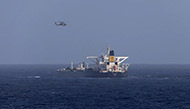For the Auto Industry, A Model For a New Era

The American steel industry has prospered since emerging from bankruptcy.
DAVID STREITFELD ESSAYA FEW YEARS AGO, an industry whose history and mythology were indelible parts of the American identity was dying. The great steel mills of Pennsylvania and the Midwest had literally built the United States, but the twin burdens of competition and self-inflicted wounds had brought them to the edge of extinction.
If they were allowed to go under, their partisans warned, the consequences would ripple through the economy at a cost too high to bear. The old saying, “As steel goes, so goes the nation,” was as much a threat as a boast.
Automakers, traditional symbols of national economic strength, are using the same argument as they seek government assistance in several countries. Germany is considering a request from Opel, the German subsidiary of General Motors, for 1 billion euros in credit guarantees. In China, slowing car sales have prompted auto executives to ask Beijing for help. (Page 4.) And in Detroit, automakers are seeking a $25 billion bailout from Congress.
“What happens in the automotive industry affects each and every one of us,” a General Motors Web site declares, warning that the consequences of a shutdown would be “devastating.”
But for the American steel industry, salvation eventually came from what it so long tried to avoid: bankruptcy. Only when the companies failed were they successfully retooled into smaller but profitable ventures. As debate continues over what, if anything, should be done for automakers, the steel industry may offer a model.
The steel and auto industries are both capital-intensive enterprises that peaked a half-century ago and have been intermittently embattled ever since. Both secured peace with their unions by vastly expanding benefits, a bargain that eventually hobbled them. Both had entrenched layers of management that believed - despite all evidence - they could wish away change.
The steel industry was beginning its long stumble when it turned to Washington for help in the late 1970s. The Carter administration responded by committing $300 million in loan guarantees to five struggling companies. Nearly a third of the funds went to help Wisconsin Steel, a company that had been around since the previous century. Thanks to a strike at a key customer, Wisconsin Steel promptly collapsed.
Despite this fiasco, Jimmy Carter’s successors tried to deliver on demands for relief. In 1984, Ronald Reagan imposed import quotas to stem the tide of cheap foreign steel. In 1999, Bill Clinton guaranteed $1 billion in loans to beleaguered producers, and the following year imposed punitive tariffs on some imports.
It was never enough. Bethlehem Steel, whose steel was used in the Hoover Dam, the Chrysler building and the George Washington Bridge in New York City, filed for bankruptcy in October 2001. It was followed by National Steel, Weirton Steel, Georgetown Steel and many others. The pain was great.
And necessary, some say. “If the steel companies had gotten all they wanted in terms of loan guarantees and import quotas, they would never have gotten better,” said Richard Fruehan, director of the Sloan Study on Competitiveness in the Steel Industry. “The bankruptcies forced their hand.”
Over the decades the companies had shed employees to stay afloat. Soon retirees greatly outnumbered the actual workers. At Bethlehem, the ratio was six retirees for every worker. All these retirees had good pensions and good health care plans .
Bankruptcy changed the rules, allowing the steel makers to unload billions of dollars in pension obligations onto the government’s Pension Benefit Guaranty Corporation and to cut more than 200,000 workers from their supposedly guaranteed medical care.
The failures also allowed for the renegotiation of labor contracts, something Wilbur L. Ross Jr., a specialist in distressed assets, realized when he began looking at the moribund industry. The only bidder for the bankrupt LTV Steel, he proceeded to buy Bethlehem and other old-line companies, putting them together as International Steel Group. He cut more employees and revamped work rules .
Steel’s turn-around was dramatic. The 17 leading companies went from a combined loss of $1.1 billion in 2003 to an after-tax profit of $6.6 billion in 2004, according to an analysis done for an industry trade group. Ross sold International Steel to the Indian entrepreneur Lakshmi Mittal for $4.5 billion in 2005, earning a tremendous return.
Thanks to all of steel’s tribulations and consolidations, the industry is relatively healthy.
If only the car companies could get to this point. In a G.M. bankruptcy, the number of product lines would be reduced, the management replaced and the investors wiped out. The enormous costs of its retirees could be off-loaded. It would be painful, just as it was with steel, but in the end someone could come in and pick up the pieces. Perhaps it would be one of the foreign carmakers, looking to expand. Perhaps it would be a distressed assets specialist, like Wilbur Ross.
Not so fast, said Mr. Ross. The investor who made a fortune off steel companies that were not bailed out is in favor of a G.M. bailout.
Mr. Ross doesn’t dispute that the auto companies are as bloated as the steel companies were, and certainly doesn’t think they should get a blank check. But he thinks the consequences of what he calls free-fall bankruptcies - ones without any government role - could be disastrous. G.M. would drag hundreds of suppliers down with it, and they would all have trouble getting back up again.
“Bankruptcy will be a total mess, and may not produce anything of value at the end of it,” Mr. Ross said. Instead, he would like to see a 90- day government loan to keep G.M. afloat on the condition that all the stakeholders - including employees, management, bond-holders - agree on a restructuring.
This, however, would give the government ultimate responsibility for the death of G.M., should that come to pass. “The government would have to have the fortitude to say, ‘We’re not going to keep pumping in money,’ and mean it,” Mr. Ross said.
스마터리빙
more [ 건강]
[ 건강]이제 혈관 건강도 챙기자!
[현대해운]우리 눈에 보이지 않기 때문에 혈관 건강을 챙기는 것은 결코 쉽지 않은데요. 여러분은 혈관 건강을 유지하기 위해 어떤 노력을 하시나요?
 [ 건강]
[ 건강]내 몸이 건강해지는 과일궁합
 [ 라이프]
[ 라이프]벌레야 물럿거라! 천연 해충제 만들기
 [ 건강]
[ 건강]혈압 낮추는데 좋은 식품
[현대해운]혈관 건강은 주로 노화가 진행되면서 지켜야 할 문제라고 인식되어 왔습니다. 최근 생활 패턴과 식생활의 변화로 혈관의 노화 진행이 빨라지고
사람·사람들
more많이 본 기사
- 폭설 속 산행 비극… 마운트 볼디서 3명 조난 사망
- ‘故장제원 아들’ 노엘 “구치소서 58kg→95kg” 모습 보니
- 한국팀 뛸 곳인데… 강력범죄 ‘충격’
- 안성기, 1월 1일 생일 하루 앞두고 심정지 상태 병원 이송..쏟아지는 응원
- 가주 판매 간 소고기 ‘이콜라이’ 오염
- 위너 송민호, 병역법 위반 혐의 불구속 기소
- ‘아듀~ 2025!’… 희망찬 새해로
- 임영웅, 2025년에도 빛난 ‘히어로’..음악·예능·공연 모두 잡았다
- [알림] 오늘 신년특집 발행, 연방 공휴일인 새해 1월1일자 신문은 발행되지 않습니다.
- 문소리, 아이유 이어 강하늘 엄마 된다..영화 ‘국제시장2’ 합류
- “10년간 모든 이민 전면 금지?” 황당 주장
- 구리선 절도범 소행에 LA 교통 통신망 ‘먹통’
- 이강인 뛰는 PSG, ‘2025 최고의 팀’
- LA 북쪽 테혼 카지노서 하룻새 10만불 ‘연속 잭팟’
- 신년 연휴 폭풍우… 비 3인치 온다
- 일사회 창립 14주년 기념식 및 송년행사
- [연말 화제] 올해도 찾아온 ‘얼굴 없는 천사’
- “라면, 못 끊겠다면 ‘이거’라도 넣어라”
- 알고보니 ‘완전식품’인 고구마의 놀라운 효능
- 목표는 1,000골… 불혹 호날두 “부상 없다면 가능”
- ‘백두산 호랑이’ 대가족 포착… “매우 희귀한 일”
- SI “김하성 영입은 A-” 수비력 유지·공격력 향상
- ‘케네디’가 또 비극 외손녀 희귀암 별세
- 원·달러 환율… 연평균 기준 ‘역대최고’ 마감
- [연말 기획] 한국계 혼혈들 두각… 각 분야에서 ‘맹활약’
- 요키치 부상… 덴버, 마이애미에 덜미
- [한인 은행장 신년사 통해 본 비전과 경영 목표] “끊임없는 변화와 혁신으로 안정적 성장 도모”
- 전남대 신년회
- “치매에 치즈가 좋대서 맨날 먹었는데”… 고지방 주의
- [경제 트렌드] AI 열풍 속에 신흥 2030 억만장자 급증
- 명품의 힘… 현대백화점 판교점 연매출 2조 찍었다
- ‘헤비급 복서’ 조슈아 구사일생 동승자 2명 사망사고에도 경상
- 사실상 고객 1인당 1만원… “생색내기 보상으로 불신만 키워”
- 오픈AI에 400억불 투자 소프트뱅크가 10% 지분
- 동포청 ‘재외동포 이해교육’ 실시
- 트럼프 “베네수엘라 마약 싣는 항만 타격”… 첫 지상 공격
- 트럼프 이름 덧붙인 ‘케네디센터’ 공연 줄취소
- 케이스쉴러 주택가격지수 상승
- [LA 일원 새해맞이 명소는] “웰컴 2026”… 남가주 새해맞이 행사 풍성
- [조지 F. 윌 칼럼] 저무는 2025년에 안도의 한숨
- [수요 에세이] 다시, 제자리로 돌아와서
- SNS, 뉴스 매체로도 인기 틱톡·유튜브·페이스북 등
- 메타, ‘제2의 딥시크’ 마누스 인수
- 샴페인, 마지막 날과 첫날을 위하여
- 안성기, 응급실 이송돼 중환자실 입원… “현재 치료 중”
- 중국, 올해 신차판매 1위… 일본 ‘20년 아성’ 깼다
- 우크라 ‘푸틴 관저 공격설’에 종전 기대감 찬물
- 트럼프 만나고온 젤렌스키 “우크라에 미군 주둔 방안 논의중”
- [미국은 지금] 책임 있는 자본 없으면 커뮤니티 미래도 없다
- xAI, 새 데이터센터 건물 매입…이름은 MS 겨냥한 ‘매크로하더’
1/5지식톡

-
 미 육군 사관학교 West Poin…
0
미 육군 사관학교 West Poin…
0https://youtu.be/SxD8cEhNV6Q연락처:wpkapca@gmail.comJohn Choi: 714-716-6414West Point 합격증을 받으셨나요?미 육군사관학교 West Point 학부모 모…
-
 ☝️해외에서도 가능한 한국어 선생님…
0
☝️해외에서도 가능한 한국어 선생님…
0이 영상 하나면 충분합니다!♥️상담신청문의♥️☝️ 문의 폭주로 '선착순 상담'만 진행합니다.☎️ : 02-6213-9094✨카카오톡ID : @GOODEDU77 (@골뱅이 꼭 붙여주셔야합니다…
-
 테슬라 자동차 시트커버 장착
0
테슬라 자동차 시트커버 장착
0테슬라 시트커버, 사놓고 아직 못 씌우셨죠?장착이 생각보다 쉽지 않습니다.20년 경력 전문가에게 맡기세요 — 깔끔하고 딱 맞게 장착해드립니다!장착비용:앞좌석: $40뒷좌석: $60앞·뒷좌석 …
-
 식당용 부탄가스
0
식당용 부탄가스
0식당용 부탄가스 홀세일 합니다 로스앤젤레스 다운타운 픽업 가능 안녕 하세요?강아지 & 고양이 모든 애완동물 / 반려동물 식품 & 모든 애완동물/반려동물 관련 제품들 전문적으로 홀세일/취급하는 회사 입니다 100% …
-
 ACSL 국제 컴퓨터 과학 대회, …
0
ACSL 국제 컴퓨터 과학 대회, …
0웹사이트 : www.eduspot.co.kr 카카오톡 상담하기 : https://pf.kakao.com/_BEQWxb블로그 : https://blog.naver.com/eduspotmain안녕하세요, 에듀스팟입니다…
케이타운 1번가
오피니언
 정숙희 논설위원
정숙희 논설위원샴페인, 마지막 날과 첫날을 위하여
 조지 F·윌 워싱턴포스트 칼럼니스트
조지 F·윌 워싱턴포스트 칼럼니스트 [조지 F. 윌 칼럼] 저무는 2025년에 안도의 한숨
 김동찬 시민참여센터 대표
김동찬 시민참여센터 대표 [미국은 지금] 책임 있는 자본 없으면 커뮤니티 미래도 없다
 성영라 수필가 미주문협 부이사장
성영라 수필가 미주문협 부이사장 [수요 에세이] 다시, 제자리로 돌아와서
 신경립 / 서울경제 논설위원
신경립 / 서울경제 논설위원 [만화경] 경영자의 ‘문제적’ 사과
 문태기 OC지국장
문태기 OC지국장 한인 정치력 업그레이드 기대
 민경훈 논설위원
민경훈 논설위원세계 역사를 바꾼 동물
 박홍용 경제부 차장
박홍용 경제부 차장 한인사회가 주목해야 할 새해 경제
 박영실 시인·수필가
박영실 시인·수필가 [화요칼럼] 피드백
1/3지사별 뉴스

메트로카드, 31년만에 역사 속으로
1994년 처음 등장해 지난 31년간 뉴욕시 전철과 버스 승차권으로 쓰인 메트로카드가 31일을 끝으로 역사 속으로 사라진다. 더 이상 메트로카…
■ 사고- 한동대·뉴욕한인청소년센터 국제여름캠프

2025 워싱턴지역 10대 뉴스
다사다난했던 2025년이 하루만 남겨둔 채 역사의 저편으로 저물고 있다. 올해의 가장 큰 뉴스는 트럼프 2기 행정부 출범과 함께 몰아친 이민 …
내년 1월부터 달라지는 MD 법안들

셀폰 위치추적, 납치된 딸 살렸다… ‘부모 통제’ 기능 활용
스마트폰에서 자녀의 위치를 확인할 수 있는 ‘부모 통제(parent control)’ 위치 추적 기능의 도움으로 납치됐던 청소년들이 잇달아 구…
[새해부터 이렇게 달라진다] 최저임금 또 오르고… 유급 병가는 더 확대

오늘 하루 이 창 열지 않음 닫기 




















































.png)


댓글 안에 당신의 성숙함도 담아 주세요.
'오늘의 한마디'는 기사에 대하여 자신의 생각을 말하고 남의 생각을 들으며 서로 다양한 의견을 나누는 공간입니다. 그러나 간혹 불건전한 내용을 올리시는 분들이 계셔서 건전한 인터넷문화 정착을 위해 아래와 같은 운영원칙을 적용합니다.
자체 모니터링을 통해 아래에 해당하는 내용이 포함된 댓글이 발견되면 예고없이 삭제 조치를 하겠습니다.
불건전한 댓글을 올리거나, 이름에 비속어 및 상대방의 불쾌감을 주는 단어를 사용, 유명인 또는 특정 일반인을 사칭하는 경우 이용에 대한 차단 제재를 받을 수 있습니다. 차단될 경우, 일주일간 댓글을 달수 없게 됩니다.
명예훼손, 개인정보 유출, 욕설 등 법률에 위반되는 댓글은 관계 법령에 의거 민형사상 처벌을 받을 수 있으니 이용에 주의를 부탁드립니다.
Close
x